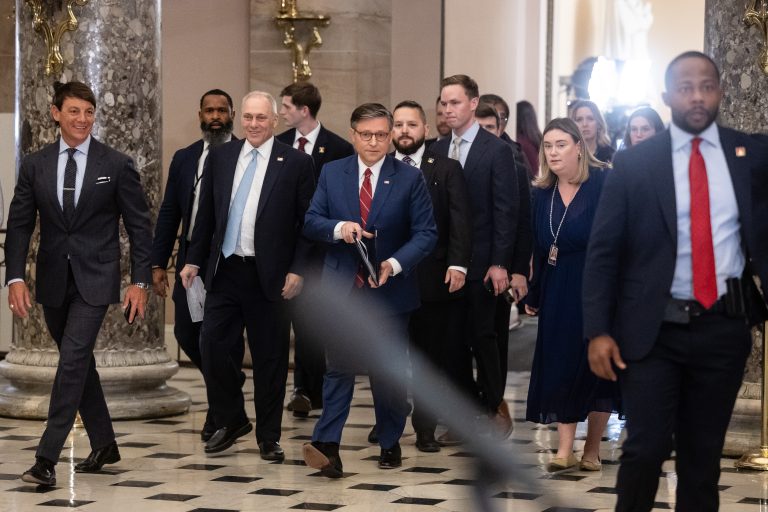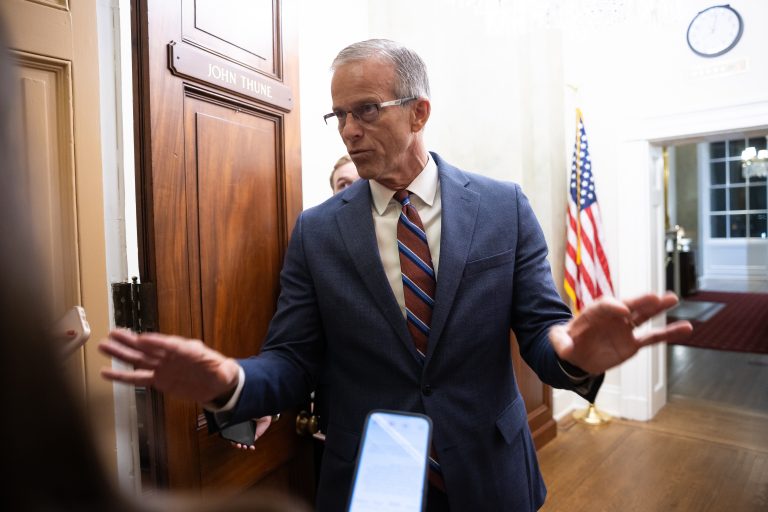The White House’s dream of clinching major new Republican victories on Capitol Hill before the midterms is crashing into the reality of a bitterly divided Congress.
Tackling major GOP priorities on the economy and health care was already going to be a heavy lift: There are deep divisions among Republicans about their strategy ahead of the end-of-year expiration of some Affordable Care Act subsidies, and President Donald Trump is showing little appetite to cut a deal with Democrats.
Trump’s top political aide raised the possibility Tuesday of pursuing another go-it-alone bill, a sequel to the sweeping tax-focused megabill the GOP passed this summer, but going down that road would require building almost complete unity among congressional Republicans.
And that would have been a tall order even before Trump went to war inside his own party this past week, effectively excommunicating longtime ally Rep. Marjorie Taylor Greene (R-Ga.) over her criticism of his policies, as well as her support for the release of Justice Department records related to the late convicted sex offender Jeffrey Epstein.
The rift comes amid other signs that Republicans in and out of Washington are growing less willing to follow Trump’s lead, whether on congressional redistricting or overhauling the Senate’s rules. And, with Trump already sketching out red lines on health care, skepticism is growing inside the GOP about burning months of political capital in an election year without a clear path forward.
Asked this week about the ugly standoff between Greene and Trump, Speaker Mike Johnson acknowledged a fact of political life that Trump has often struggled to grasp: Today’s enemy could be tomorrow’s indispensable ally.
“I work on unity in the party, and my encouragement of everybody is to get together,” Johnson said. “We’ve got to do all that in order to deliver for the people.”
Johnson’s peacemaker stance comes as House Republicans privately plot a health care overhaul, with GOP leaders pitching their members on policy options during a closed-door conference meeting Tuesday. One slide shared by House Majority Leader Steve Scalise during the meeting knocked the expiring Obamacare subsidies, calling them part of the “Unaffordable Care Act.”
Around the same time, White House deputy chief of staff James Blair at a Bloomberg News event sketched out a major “affordability” bill that could include $2,000 checks that Trump has pitched as tariff “dividends” as well as health care legislation along the lines of what House Republicans are discussing.
Those ideas are not likely to get Democratic buy-in — especially with less than a year before the midterms. That means the GOP would have to explore party-line approaches to passing any policy agenda. But Senate Republicans have spurned Trump’s demands that they eliminate the filibuster that requires bipartisan buy-in for most legislation, leaving the convoluted reconciliation process, which was used to pass this summer’s megabill, as their only viable choice.
Talk of another reconciliation bill has been hanging around Hill GOP circles for months, ever since House leaders dangled the promise of a second bite at party-line legislation to conservative hard-liners earlier this year in exchange for their votes to pass the “big, beautiful bill.”
But that push appeared to fizzle earlier this fall. And just two weeks ago, during a meeting with Senate Republicans, Trump himself expressed skepticism about how much another reconciliation bill could accomplish. Some Republicans still want to try and revive the idea for the spring, but they are facing a hard sell with many members who remember the political trauma their party suffered amid attempts to repeal and replace Obamacare in 2017.
Sen. Lisa Murkowski (R-Alaska) said in an interview that she did not want to pursue a GOP-only health care bill, arguing that it would undermine efforts to work with Democrats on other issues like funding the government
“I don’t want another one-sided, partisan reconciliation bill right now — I want us to legislate,” Murkowski said. “Let’s be legislators here. Reconciliation is, yes, it’s a tool for us, but it’s a partisan tool and look at how divided we are right now. … That’s not the way to go.”
Republicans have barely any room for error if they are going to launch another party-line policy bill. Murkowski, notably, was a decisive vote in getting the first GOP megabill through the Senate over the summer — after helping to sink the 2017 partisan health care bill.
To get another reconciliation bill passed now, Republicans would need to lean on their most vulnerable members during a time in the election cycle when party leaders typically become shy about making their front-liners take politically tough votes that could negatively ricochet in swing districts.
Retiring Sen. Thom Tillis (R-N.C.), who voted against the reconciliation bill in July, left the door open to pursuing a new party-line bill. But underscoring the headache waiting for GOP leaders and the administration, he floated using it to at least partially address some of what he called the “problematic” policies from the first Republican megabill.
He also voiced a concern that has taken root with many of his House and GOP Senate colleagues — that if they are going to make a second run at reconciliation, they need to be unified at the outset about the nature of the end product rather than figuring it out along the way.
“It could go sideways real quick if the scope changes much, so we’d have to have a lot of agreement up front to make sure it was going to be successful,” he said in an interview.
Inside the closed-door conference meeting across the Capitol Tuesday morning, GOP leaders got pushback to their ambitious health care agenda from Rep. Nathaniel Moran (R-Texas), who asked why they had waited until just weeks before the expiration deadline for the Obamacare subsidies.
House Republicans, Moran countered in the meeting, should have been working on alternatives months ago, according to four people granted anonymity to share the private exchange.
GOP leadership aides and senior Republicans on Capitol Hill say they have been waiting for months for Trump to outline what he wants on health care. But the president only started weighing in publicly on policy options in recent days.
The president on Tuesday warned that the only thing he would support would be a bill that sends “THE MONEY DIRECTLY BACK TO THE PEOPLE,” adding that Congress should “not waste your time and energy on anything else” and “GET IT DONE, NOW.”
Rep. Don Bacon (R-Neb.) added that Trump’s proposal — to essentially restructure the subsidies to give them directly to Americans — was a “welcome discussion … but we’re not going to get that done before Dec. 31. That’s unlikely.”
Asked about Trump’s comments, Senate Majority Leader John Thune didn’t close the door Tuesday night to the chances lawmakers could reach a bipartisan health care deal, but he said that would be up to what Democrats would be willing to accept. They have been cool to the health savings account ideas favored by the GOP.
“We’ve got members who are very interested in addressing the affordability of health care,” Thune added. “The question is, what’s the best way to do it.”
Senate Budget Committee Republicans are keen to advance a budget resolution that would unlock the filibuster-skirting power of a second reconciliation bill, but they are tentatively looking at early next year to do that. And they are getting pushback from their colleagues behind the scenes.
When Sen. John Kennedy of Louisiana pitched fellow Senate Republicans during a caucus lunch about using the fast-track procedure to pass a health care plan, a colleague pointed out that many of the GOP’s favorite policies wouldn’t comply with the strict rules governing the budget reconciliation process, according to an attendee who was granted anonymity to describe the private discussion.
Kennedy acknowledged in an interview he can’t guarantee a bill will ever make it to the floor, but he suggested there was a pent-up feeling among some Republicans that Congress, despite being in GOP hands, has little to show for their majority.
“That’s the problem — nothing’s happened. We’re not doing anything. I think some of that was reflected in the [off-year] elections” earlier this month, Kennedy said.
“Everybody says, what about the One Big Beautiful Bill? That was yesterday — I mean what have we done since then?” he continued. “We haven’t done anything for months, and a lot of people — you are talking to one — are sick of it.”
Calen Razor contributed to this report.


